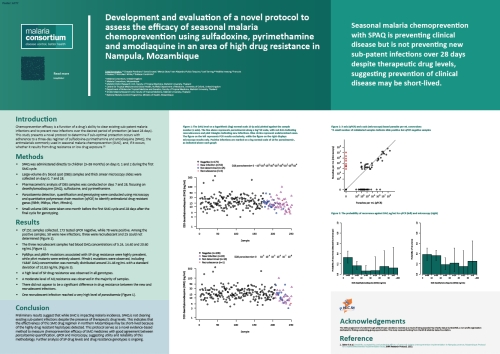Publications

Publication Date:
21/10/2023
Author:
Craig Bonnington
Chayada Piantham
Sonia Enosse
Mercia Sitoe
Ivan Alejandro Pulido Tarquino
Joel Tarning
Mallika Imwong
Francois H Nosten
Nicholas J White
Baltazar Candrinho
Type:
Poster

Development and evaluation of a novel protocol to assess the efficacy of seasonal malaria chemoprevention using sulfadoxine, pyrimethamine and amodiaquine in an area of high drug resistance in Nampula, Mozambique
Publication Date:
21/10/2023
Author:
Craig Bonnington
Chayada Piantham
Sonia Enosse
Mercia Sitoe
Ivan Alejandro Pulido Tarquino
Joel Tarning
Mallika Imwong
Francois H Nosten
Nicholas J White
Baltazar Candrinho
Type:
Poster

Publication Date:
21/10/2023
Author:
Craig Bonnington
Chayada Piantham
Sonia Enosse
Mercia Sitoe
Ivan Alejandro Pulido Tarquino
Joel Tarning
Mallika Imwong
Francois H Nosten
Nicholas J White
Baltazar Candrinho
Type:
Poster
Publication

Development and evaluation of a novel protocol to assess the efficacy of seasonal malaria chemoprevention using sulfadoxine, pyrimethamine and amodiaquine in an area of high drug resistance in Nampula, Mozambique
Publication Date:21/10/2023
Author:
Craig Bonnington
Chayada Piantham
Sonia Enosse
Mercia Sitoe
Ivan Alejandro Pulido Tarquino
Joel Tarning
Mallika Imwong
Francois H Nosten
Nicholas J White
Baltazar Candrinho
Type:
Poster
Seasonal malaria chemoprevention with SPAQ is preventing clinical disease but is not preventing new sub-patent infections over 28 days despite therapeutic drug levels, suggesting prevention of clinical disease may be short-lived.
Chemoprevention efficacy is a function of a drug’s ability to clear existing sub-patent malaria infections and to prevent new infections over the desired period of protection (at least 28 days). This study presents a novel protocol to determine if sub-optimal protection occurs with adherence to a three-day regimen of sulfadoxine-pyrimethamine and amodiaquine (SPAQ), the antimalarials commonly used in seasonal malaria chemoprevention (SMC), and, if it occurs, whether it results from drug resistance or low drug exposure.
This poster was presented at the 72nd annual meeting of the American Society of Tropical Medicine and Hygiene.
Country: Mozambique
Keywords: ASTMH | Malaria | Research | Resistance management | SMC
« Back to Publications